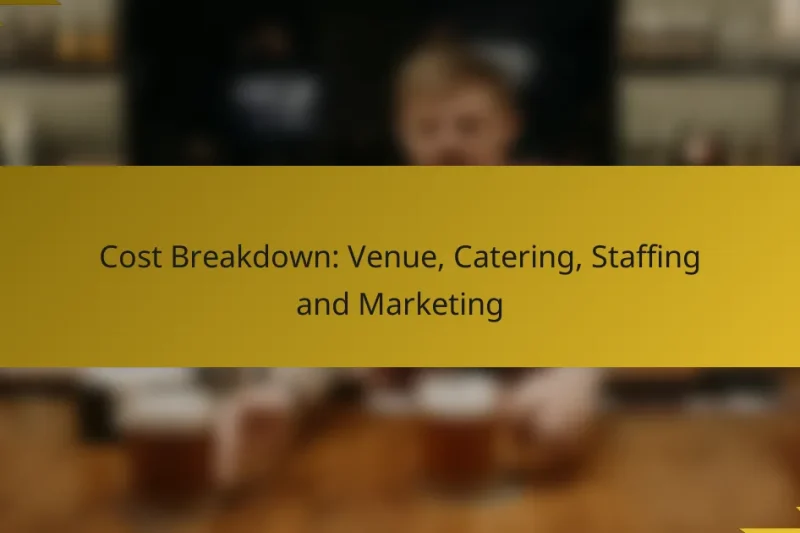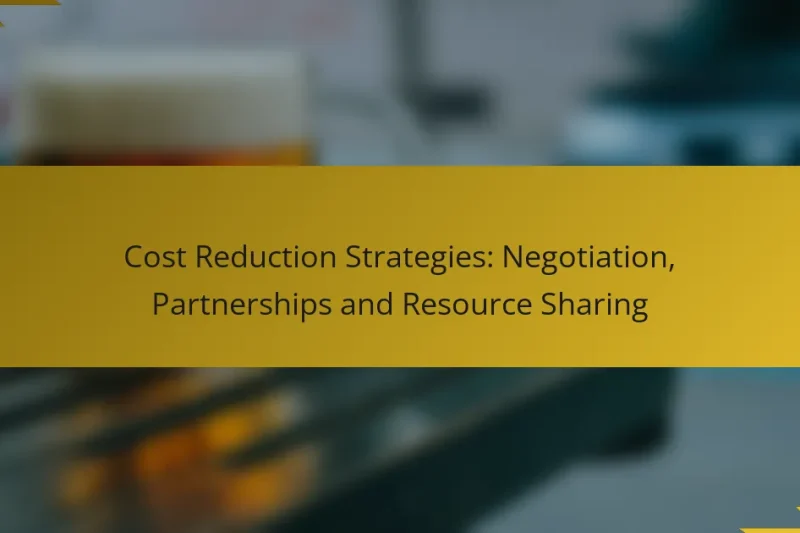When planning an event, understanding the cost breakdown for venue, catering, staffing, and marketing is crucial … Cost Breakdown: Venue, Catering, Staffing and MarketingRead more
Budgeting for Event Management
Budgeting for event management is essential for aligning expenses with your event goals and ensuring effective resource allocation. A well-structured budget not only helps prevent overspending but also enhances financial accountability throughout the planning process. Utilizing various budgeting tools can streamline financial tracking and assist in making informed decisions during the event.
Cost Reduction Strategies: Negotiation, Partnerships and Resource Sharing
Cost reduction strategies are essential for businesses aiming to enhance efficiency and maintain service quality. Techniques … Cost Reduction Strategies: Negotiation, Partnerships and Resource SharingRead more
Budgeting for Wine Events: Tastings, Dinners and Festivals
Budgeting for wine events such as tastings, dinners, and festivals requires careful consideration of various costs … Budgeting for Wine Events: Tastings, Dinners and FestivalsRead more
Managing Unexpected Expenses: Contingency Planning and Flexibility
Managing unexpected expenses is crucial for maintaining financial stability in an unpredictable world. By establishing a … Managing Unexpected Expenses: Contingency Planning and FlexibilityRead more
Sponsorship Opportunities: Brands, Local Businesses and Community Partners
Sponsorship opportunities in Los Angeles present a unique chance for brands, local businesses, and community partners … Sponsorship Opportunities: Brands, Local Businesses and Community PartnersRead more
Evaluating Marketing Channels: Social Media, Email and Influencer Outreach
Evaluating marketing channels such as social media, email, and influencer outreach is crucial for maximizing engagement … Evaluating Marketing Channels: Social Media, Email and Influencer OutreachRead more
How to create a budget for event management?
Creating a budget for event management involves outlining all potential expenses and aligning them with your event goals. A well-structured budget helps ensure that you allocate resources effectively and avoid overspending.
Identify event goals and objectives
Start by clearly defining the goals and objectives of your event. This could include increasing brand awareness, generating leads, or fostering community engagement. Understanding these aims will guide your budgeting decisions and help prioritize spending.
For example, if your goal is to attract a large audience, you might allocate more funds to marketing and venue selection. Conversely, if the focus is on networking, consider investing in quality speakers and interactive sessions.
Estimate costs for venue and catering
Venue and catering are often the largest expenses in event management. Research various venues to compare rental fees, capacity, and amenities. Typical venue costs can range from a few hundred to several thousand dollars depending on location and size.
Catering costs can vary widely based on menu choices and the number of attendees. A basic meal might cost around $20 to $50 per person, while more elaborate options can exceed $100 per person. Always factor in additional charges like service fees and gratuities.
Include marketing and promotion expenses
Marketing and promotion are crucial for ensuring your event reaches the intended audience. Allocate funds for digital marketing, print materials, and social media campaigns. A typical budget might set aside 10-20% of total costs for these efforts.
Consider using a mix of channels, such as email newsletters, social media ads, and local partnerships, to maximize outreach. Track your spending to evaluate the effectiveness of each channel and adjust as needed.
Allocate funds for entertainment and speakers
Entertainment and speakers can significantly enhance the attendee experience and should be factored into your budget. Depending on the event type, costs for speakers can range from a few hundred to several thousand dollars.
When selecting entertainment, consider your audience’s preferences and the event theme. Allocate a portion of your budget for engaging activities, such as live music or interactive workshops, which can elevate the overall experience.
Plan for unexpected costs
Unexpected costs can arise in any event, so it’s wise to include a contingency fund in your budget. A common practice is to set aside 10-15% of the total budget for unforeseen expenses, such as last-minute venue changes or additional supplies.
Regularly review your budget throughout the planning process to identify areas where you may need to adjust. Being proactive about potential issues can help you stay within budget and ensure a successful event.
What are the best budgeting tools for event managers?
Event managers can benefit from various budgeting tools that streamline planning and financial tracking. The best tools integrate ticketing, project management, detailed budgeting, and financial tracking to ensure events stay within budget.
Eventbrite for ticketing and registration
Eventbrite is a popular platform for managing ticket sales and registrations, making it essential for event budgeting. It allows event managers to set ticket prices, track sales in real-time, and manage attendee information efficiently.
When using Eventbrite, consider its fee structure, which typically includes a percentage of ticket sales plus a flat fee per ticket. This can impact your overall budget, so factor these costs into your pricing strategy.
Asana for project management
Asana is an effective project management tool that helps event managers organize tasks, deadlines, and team collaboration. By creating a project timeline, you can allocate resources and track progress, ensuring that all budget-related tasks are completed on time.
Utilizing Asana’s features like task assignments and progress tracking can help prevent overspending by keeping everyone accountable. Regularly review your project milestones to stay aligned with your budget goals.
Excel for detailed budgeting
Excel remains a go-to tool for detailed budgeting due to its flexibility and powerful calculation capabilities. You can create custom spreadsheets to track expenses, income, and forecasts, allowing for in-depth financial analysis.
To maximize Excel’s effectiveness, set up templates that include categories for fixed and variable costs. Regularly update your spreadsheet to reflect actual spending versus planned budgets, helping you identify any discrepancies early on.
QuickBooks for financial tracking
QuickBooks is a comprehensive accounting software that simplifies financial tracking for events. It allows you to manage invoices, expenses, and payroll, providing a clear overview of your event’s financial health.
When using QuickBooks, ensure you categorize all transactions accurately to maintain precise financial records. This will help you generate reports that inform future budgeting decisions and improve overall financial management for your events.
How to track expenses during an event?
Tracking expenses during an event is crucial for staying within budget and ensuring financial accountability. Utilize various tools and methods to monitor spending in real-time, which helps in making informed decisions as the event progresses.
Use mobile apps for real-time updates
Mobile apps designed for expense tracking can provide instant updates on spending. These applications often allow team members to input expenses as they occur, ensuring that everyone has access to the most current financial data.
Look for apps that offer features like receipt scanning and categorization of expenses. Popular options include Expensify and Mint, which can streamline the tracking process and reduce manual entry errors.
Implement a shared spreadsheet for team access
A shared spreadsheet can be an effective way to track expenses collaboratively. Using platforms like Google Sheets allows all team members to update and view expenses in real-time, promoting transparency and accountability.
Ensure the spreadsheet includes categories for different types of expenses, such as venue costs, catering, and marketing. This organization helps in quickly identifying areas where spending may exceed the budget.
Set up a dedicated expense reporting system
Creating a dedicated expense reporting system can simplify the process of tracking and approving expenses. This system should outline clear guidelines for what can be reimbursed and the necessary documentation required.
Consider using a combination of digital forms and approval workflows to streamline submissions. Regularly review and reconcile reported expenses against the budget to catch any discrepancies early on.
What are common budgeting mistakes in event management?
Common budgeting mistakes in event management include underestimating costs, neglecting essential expenses, and failing to allocate funds for unexpected issues. These errors can lead to financial strain and impact the overall success of the event.
Underestimating venue costs
One of the most frequent budgeting mistakes is underestimating venue costs. This includes not only the rental fee but also additional charges such as utilities, cleaning, and security. It’s crucial to obtain a detailed quote and account for all potential expenses.
For example, a venue may advertise a low base price, but hidden fees can increase the total cost by 20-30%. Always ask for a breakdown of costs and consider visiting the venue to assess any additional needs.
Neglecting to budget for staff
Another common oversight is neglecting to budget for staff expenses. This includes not only salaries but also benefits, training, and overtime. Depending on the event size, staffing costs can account for a significant portion of the budget.
Consider hiring temporary staff or volunteers, but ensure you budget for their training and any necessary equipment. A good rule of thumb is to allocate around 15-25% of your total budget for staffing needs.
Ignoring contingency funds
Failing to include contingency funds in your budget can lead to financial difficulties if unexpected costs arise. A contingency fund acts as a safety net for unforeseen expenses, which are common in event management.
It’s advisable to set aside 10-15% of your total budget for contingencies. This allows for flexibility and helps ensure that your event can adapt to any last-minute changes or emergencies without financial strain.





